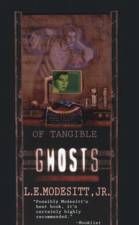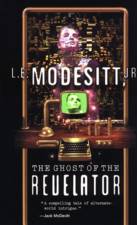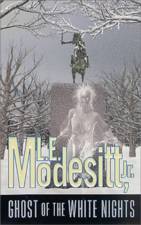

| Click on a book's image or title to order from Amazon.com |

Of Tangible Ghosts
Tor, PB, © 1994, 381 pp, ISBN #0-812-54822-1Reviewed December 2002
Of Tangible Ghosts is part science fantasy, and a huge helping of alternate history. Modesitt posits that people who die of unnatural causes stick around as ghosts for some period of time afterwards, with the peculiar behaviors we attribute to ghosts (speaking cryptically, re-enacting their deaths, etc.). The Earth of Ghosts is profoundly affected by this.
For one thing, mass killings result in a land covered in ghosts, making such areas practically uninhabitable. This tends to retard tendencies of countries to engage in mass warfare, since it effectively results in a "scorched earth" approach to major wars. Additionally, it means that countries which are adept at expanding their influences gradually have an upper hand. Additionally, people tend to be unwilling to send their troops to far-off lands, since their populaces object to their soldiers' ghosts being stranded far from home. This means that relatively isolated countries tend not to get too involved in world affairs.
Such it is for Columbia, this Earth's version of the United States. The English had trouble colonizing North America, so Columbia has a large Dutch contingent, and doesn't control as much of the continent. And history since 1700 has taken some fairly strange turns. Modern technology is different, too, with steam-powered cars and "Babbage" engines instead of computers, which are just recently graduating from purely mechanical designs.
Our hero, Doktor Johan Eschbach, is a former government minister in Columbia, now a Natural Resources professor in Vanderbraak Centre (which I think is in upstate New York). Widowed, he lives alone but is involved with Llysette duBois, a French refugee and singer who also teaches at the university. He lives in his childhood home, which is 'haunted' by the ghost of a woman named Carolynne, who was killed there many years earlier.
Johan's quiet life is disrupted, first by the murder of a colleague of Llysette's, then by being asked by the head of the Spazi (sort of like the FBI) to keep an eye out for possible spies in Vanderbraak Centre. From here, Johan gets caught up in a power struggle between the Columbian President and its Speaker, and a conspiracy to create some new Babbage technology which could profoundly affect the nature of ghosts.
As you can see, the rich texture of its background is a key attraction of Of Tangible Ghosts. Besides the fun of figuring out how Columbia's Earth differs from ours, Modesitt goes to great pains to portray Columbia and Vanderbraak Centre as living, breathing milieus, from the snowy setting and stolid Dutch heritage of the latter, to the familiar, vaguely colonial, but eerily different Columbian government and capitol. Johan's day-to-day life is vividly portrayed, from picking up his mail to dealing with his lazy students. This is not as tedious as it sounds, as the latter is actually pretty humorous and the former sort of thing is part of the texture of the story which not only provides the story with its feel but helps to lay some red herrings in the plot.
The plot is actually rather subtle, as it's clear immediately that something is going on, but it's not evident just what. Johan is generally a step ahead of the reader - and two steps ahead of his adversaries - but though this makes it not a wholly rewarding mystery, it makes sense since Johan is a professional at this sort of thing. One might reasonably argue that things sometime come a little too easily for Johan, however. That's perhaps the book's greatest flaw; the tension never ratchets up as high as it might to become fully rewarding. There's no moment when you want to stand up and cheer. Although there's certainly plenty of scheming and action in the latter half of the book.
Ghosts also has a melancholy feel permeating every page. The wintery setting and Johan's melancholy life - punctuated with his meeting with Llysette - impart a profoundly sad feeling to the story. The ghosts - particularly Carolynne - add to the sense of something lost. This Earth isn't just another twist in reality, something about it doesn't feel quite right, something's off-kilter. That's a rare feeling for a novel which is otherwise so grounded in familiar day-to-day living.
Although I could see some finding it slow, I enjoyed Of Tangible Ghosts very much. It made me think, and I enjoyed my stay with Johan as well as following his weaving through other peoples' machinations. There are two other books set in this world, and I'd like to read them.

The Ghost of the Revelator
Tor, PB, © 1998, 298 pp, ISBN #0-812-54536-2Reviewed March 2003
Sometimes sequels are actually better than the original, and so it is with The Ghost of the Revelator, L.E. Modesitt's sequel to his alternate-world fantasy, Of Tangible Ghosts. More focused and with more fun tidbits about the history of the milieu, Revelator is altogether more successful.
A year or so after the events of the first novel, Johan Eschbach and his diva wife Lysette du Boise have settled into their routine in the Columbian town of New Bruges, where they are both professors. But this changes when Lysette is extended an invitation to sing in Great Salt Lake City of the Mormon nation of Deseret. A French refugee, she's been prevented from having a singing career until this invitation, and suddenly she's also invited to sing before the Columbian President, and many diverse hands take an interest in her trip to Deseret.
Johan accompanies her, since unaccompanied women are frowned upon in Deseret. But in the meantime he takes out some insurance, deals with several attempts on their lives in New Bruges, and keeps his eyes out in Deseret.
The Ghost of the Revelator is at heart a suspense and espionage story, hinging on the complex motivations of the three North American nations (Columbia, Deseret, and New France) and the Austrian Empire in Europe. As we know from the first book, Johan has access to ghost-related technology few others are even aware of, and it seems that some of the parties snooping around their home in New Bruges are interested in that, as well.
So the story is actually fairly simple, but well-told, focusing on Lysette's anxieties about her revived career, Johan's concerns regarding the timing of events, the disruption of their married routine, and some of their relationships to the people around them. And on top of this there are the tidbits of information divulged about Columbia's history - the fate of George Washington, for instance. Modesitt perhaps plays the "Who can tell know things might have gone had X gone differently?" card a little too often, but it's still enjoyable material.
Although the book takes some time to get going, ultimately everything ties together cleverly and you won't feel like you've really been taken the roundabout way to get there. If you invested the time to read Of Tangible Ghosts and felt it was only so-so, you should give this one a try.

Ghost of the White Nights
Tor, PB, © 2001, 346 pp, ISBN #0-765-34032-1Reviewed November 2003
The third installment of Modesitt's alternate history fantasy opens with our erstwhile hero, retired spy Doktor Johan Eschbach, and his diva wife Lysette du Boise, invited to the capitol district of Columbia to have Lysette perform for the Speaker of the House - an honor especially since Eschbach belongs to the opposing party. The trip is set against a backdrop of a world nearing war: Austria is posturing towards the Americas, while Russia and Columbia are both running short of oil, as Austria controls the middle east. And Russia is starting to experiment with advanced missile technology.
The performance is a cover for the pair to be sent to Russia for Lysette to perform for the Tsar, and Johan to do a little spying and negotiating to gain the rights for Columbia to drill for oil in Alaska. It's a mission that someone strongly objects to, as the pair are spied on and the target of more than one assassination attempt. But, being good citizens with little choice, they fly to St. Petersburg, and into a web of intrigue surrounding both the Russian ministries and the Columbian embassy.
White Nights is not so strong a story as The Ghost of the Revelator, although like its predecessors it is at heart an espionage novel. Despite being in an even more foreign land than Deseret, the tension never feels quite as great, perhaps because they are tacitly supported by the Columbian embassy, and they have allies - as well as enemies - in unexpected places.
The story does have a pleasantly exotic feel, though. The bleak and cold Russia of Johan's world feels not so different from what Americans imagine the Soviet Union must have been like - Modesitt suggesting that Russia's problems perhaps stem from root much deeper than Communism. As usual, politics are central to the overall story - Johan can't escape them, since he's too competent and too aware of his responsibilities to his country. And Russia has its own citizens in Johan's mold - sympathizing with him in some cases, and against him in others.
The novel retains the slow pace of the first two, but Modesitt seems to be imposing more structure and better pacing since the first volume, and here the story starts out slowly indeed, but becomes quite lively in the last few chapters, combining revelations with decisive action. But if you don't appreciate the setting and the loving care with which Modesitt unfolds the portrait of his world, then the book isn't likely to work for you. Moreover, the story isn't a quantum leap beyond the first two books - as, in a sense, Revelator was beyond Of Tangible Ghosts - so don't expect a substantial departure from the formula, either.
Nonetheless, I enjoyed it, and hope he keeps writing them. There are at least two obvious venues Johan has yet to visit, and I hope that Modesitt will also see fit to further develop the character of ghosts in this world, rather than simply exploring different cultures. Ratcheting up the one facet which makes this world viscerally different from our own in a fundamental way would make future volumes all the more entertaining.
hits since 4 December 2002.